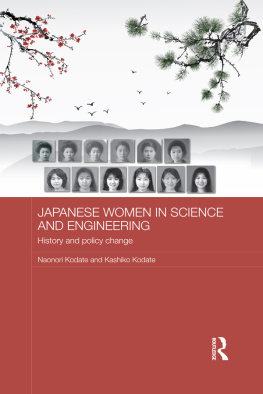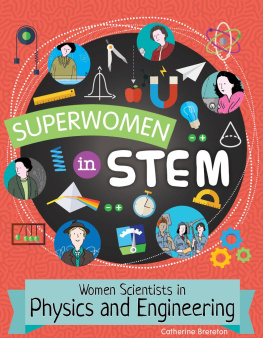This book written by Professor K. Kodate, along with co-author and second son Dr N. Kodate, offers an excellent overview of historical developments in female education in Japan, while focusing on the progress made by Japanese women in STEM in recent years. Leaving aside Professor Kodates own achievements in promoting gender equality in the field, her experience as an excellent scientist, educator, and pioneer as a woman in science who struck a great life-work balance is also reflected in the book.
Atsuko Tyama,Former Minister of Education, Culture, Sports, Science and Technology
This book deals with the situation surrounding Japanese women in scientific research. As the authors state, like many other countries, Japan is still in the middle of tackling the common problems known as glass ceiling and leaky pipes that are facing women in STEM. The book is very timely as it offers a very deep and documented study of the past and present. The analysis of the past, current laws and policies aimed at achieving equality between men and women, the important role played by scientific societies and the results in terms of statistics and surveys is a very helpful way to focus our minds on the future. I firmly believe that studies like this book will help move the situation forward.
Mara J. Yzuel, Department of Physics, Universidad Autnoma de Barcelona, Spain and Former President of SPIE, the International Society for Optics and Photonics
This important book explains why womens participation in STEM fields has lagged so badly in Japan relative to other industrialized nations, and describes how and why change is finally accelerating. Deeply held beliefs about womens role in Japanese society remain a serious barrier. Time does not change these visionary and courageous leadership, laws, and data-driven remedies are required.
Nancy Hopkins, Amgen Inc. Professor of Biology (emerita), Massachusetts Institute of Technology, USA
Japanese Women in Science and Engineering
The gender gap in science, technology, engineering and mathematics (STEM) varies greatly from country to country, and the number of Japanese women in these fields remains relatively few. This prompts us to ask why the proportion of female scientists in Japan is still remarkably low and what measures the government, universities and research institutes are taking to address this issue.
This book sheds light on historical developments and the current gender equality situation in Japan, through the lens of women in STEM. It shows how a policy of gender equality in science and engineering has been introduced through the coordinated efforts of academia, scientific societies and the government, and how this has led to a slow but steady increase in female representation. The book draws on extensive data including interviews with government officials, scientists and educators in Japan to provide a revealing case study on how the underrepresentation of women in the fields of science, technology and engineering has been approached and dealt with by a national government. It heralds a new era for female scientists, by showcasing several programmes undertaken by government, universities and national research institutions to support multiple career paths for and the progression of female scientists in Japan.
Tracing the historical development of Japans policies towards women in science and engineering, this book will be welcomed by students and scholars interested in Japanese studies, comparative social policy, gender studies, education policy, political economy, and the history of science and technology.
Naonori Kodate is a Lecturer in Social Policy at University College Dublin, Ireland. His main research area is comparative social policy, particularly in health care. He has co-edited a book entitled Maternity Services and Policy in an International Context: Risk, Citizenship and Welfare Regimes (Routledge, 2015).
Kashiko Kodate is Professor Emeritus at Japan Womens University in the Department of Mathematical and Physical Science, currently a specially appointed Professor at the University of Electro-Communications, Tokyo, and CEO of Photonic System Solutions Inc. (PSS). She was a former Director of Gender Equality Bureau at the Japan Science and Technology Agency.
Routledge Contemporary Japan Series
1 A Japanese Company in Crisis
Ideology, strategy, and narrative
Fiona Graham
2 Japans Foreign Aid
Old continuities and new directions
Edited by David Arase
3 Japanese Apologies for World War II
A rhetorical study
Jane W. Yamazaki
4 Linguistic Stereotyping and Minority Groups in Japan
Nanette Gottlieb
5 Shinkansen
From bullet train to symbol of modern Japan
Christopher P. Hood
6 Small Firms and Innovation Policy in Japan
Edited by Cornelia Storz
7 Cities, Autonomy and Decentralization in Japan
Edited by Carola Hein and Philippe Pelletier
8 The Changing Japanese Family
Edited by Marcus Rebick and Ayumi Takenaka
9 Adoption in Japan
Comparing policies for children in need
Peter Hayes and Toshie Habu
10 The Ethics of Aesthetics in Japanese Cinema and Literature
Polygraphic desire
Nina Cornyetz
11 Institutional and Technological Change in Japans Economy
Past and present
Edited by Janet Hunter and Cornelia Storz
12 Political Reform in Japan
Leadership looming large
Alisa Gaunder
13 Civil Society and the Internet in Japan
Isa Ducke
14 Japans Contested War Memories
The memory rifts in historical consciousness of World War II
Philip A. Seaton
15 Japanese Love Hotels
A cultural history
Sarah Chaplin
16 Population Decline and Ageing in Japan The Social Consequences
Florian Coulmas
17 Zainichi Korean Identity and Ethnicity
David Chapman
18 A Japanese Joint Venture in the Pacific
Foreign bodies in tinned tuna
Kate Barclay
19 Japanese-Russian Relations, 19072007
Joseph P. Ferguson
20 War Memory, Nationalism and Education in Post-War Japan, 19452007
The Japanese history textbook controversy and Ienaga Saburos court challenges
Yoshiko Nozaki
21 A New Japan for the Twenty-First Century
An inside overview of current fundamental changes and problems
Edited by Rien T. Segers
22 A Life Adrift
Soeda Azembo, popular song and modern mass culture in Japan
Translated by Michael Lewis
23 The Novels of Oe Kenzaburo
Yasuko Claremont
24 Perversion in Modern Japan
Psychoanalysis, literature, culture
Edited by Nina Cornyetz and J. Keith Vincent
25 Homosexuality and Manliness in Postwar Japan
Jonathan D. Mackintosh
26 Marriage in Contemporary Japan
Yoko Tokuhiro
27 Japanese Aid and the Construction of Global Development
Inescapable solutions
Edited by David Leheny and Carol Warren
28 The Rise of Japanese NGOs
Activism from above
Kim D. Reimann
29 Postwar History Education in Japan and the Germanys
Guilty lessons
Julian Dierkes
30 Japan-Bashing
Anti-Japanism since the 1980s
Narrelle Morris
31 Legacies of the Asia-Pacific War
The Yakeato generation
Edited by Roman Rosenbaum and Yasuko Claremont







